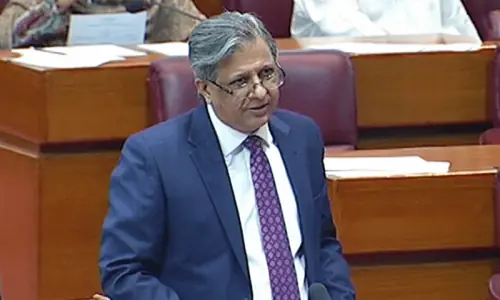THE lull has been broken and the country is bleeding again. Lahore, Mohmand Agency and Peshawar have been attacked in rapid succession by the militants.
In between, Karachi and Quetta have suffered violence too; a diverse map of militancy and terrorism appears to once again be stretching the will and capabilities of the state.
As the country mourns the latest casualties in the long war against militancy, policymakers need to urgently turn their attention to the reasons and causes for the latest spike.
While panic must be avoided — the attacks are extremely disturbing, but have not been catastrophic in scale — the political and military leadership clearly have no reason to be complacent.
The Lahore, Mohmand Agency and Peshawar attacks have all targeted security forces or public officials and none of them appear to be random or unplanned.
It appears that the militants are once again not only growing in confidence but that the support and facilitation networks on which attackers rely are being rehabilitated.
In the past, growing confidence and execution capabilities have been a prelude to a sustained and painful series of attacks. The past must not be allowed to repeat itself.
If a new, sustained wave of terrorism is to be avoided and the resultant downturn in violence to become a permanent trend, the anti-militancy policy framework will need to be overhauled.
Already, officials are publicly pointing figures at outside powers, especially Afghanistan, and appear to be trying to externalise blame. Certainly, the existence of TTP sanctuaries in Afghanistan is undisputed.
But the policy challenges there need to be addressed incrementally, meaningfully and in a sustained manner. The sanctuary problem along the Pak-Afghan border is a stubborn one and will not yield to short-term convulsions and rancour on either side.
Indeed, the quiet spells are when behind-the-scenes diplomacy and military dialogue are most important — the high emotionalism in the aftermath of an attack can inform the need to have a long-term solution, but is likely to prevent results-oriented talks in the short-term.
Afghanistan and Pakistan must keep dialogue open and be incrementally progressive at all times.
Domestically, the bombings have shed an unsavoury light on the patchy implementation of the National Action Plan.
Developing the will to want to end all forms and manifestations of militancy is important, but the strategy and operational tactics to do so is an essential concomitant.
The reaction of the Punjab government to the Lahore bombing is illustrative of the muddleheaded nature of the state’s response.
Rapid-fire, after-the-event orders for crackdowns and heightened security measures appear to be announced more for public consumption than out of hope for real gains in the fight against militancy.
To break the link between tribal sanctuaries and urban targets, and to break up the terrorist networks inside the country’s cities and towns, a calm, focused national leadership is needed.
Published in Dawn, February 16th, 2017






























